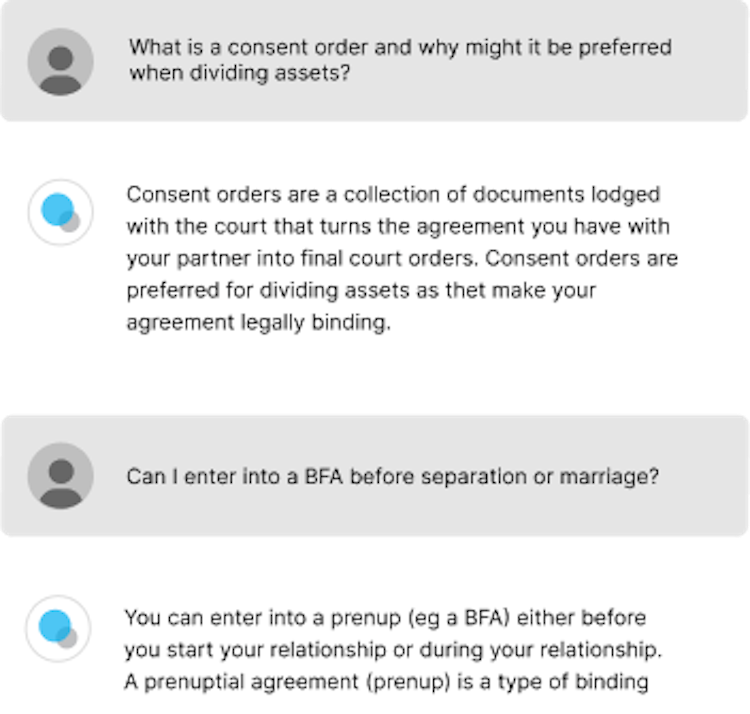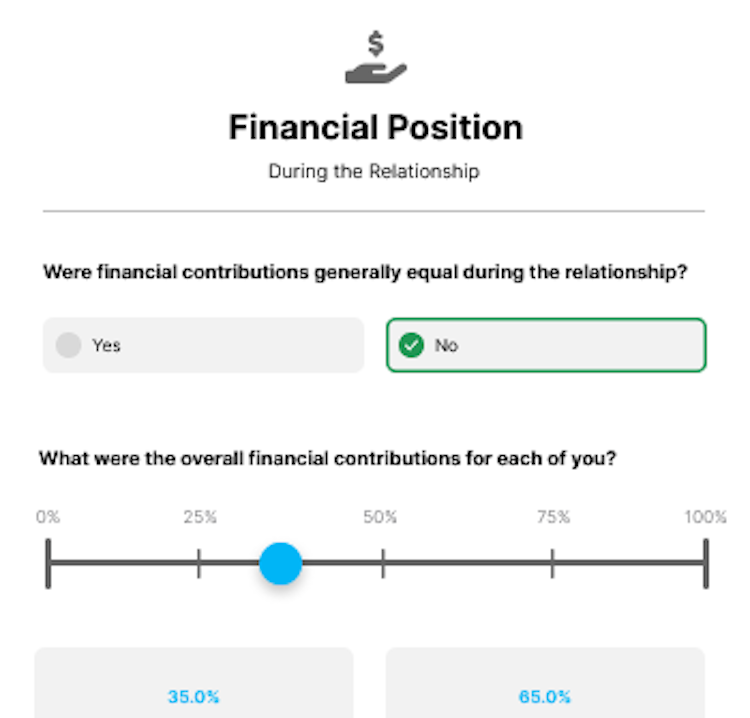
Consent Orders
Get consent orders from $1,100. Save thousands in legal fees, compared to other law firms.
Free discussion limited to issues about your finances
You've Separated & Reached An Agreement
You’ve separated from your partner and (finally!) reached an agreement on who gets what… It’s now time to make your agreement legally binding. If you have not yet agreed how to divide your assets (or at least agreed on the main items), then consent orders may not be suitable at this stage - try our negotiation service where we help you reach an agreement with your former partner.
We know how expensive legal work can seem to be as you’re researching across the web. Many law firms can easily charge over $4,000 to $5,000 to prepare consent orders to legally divide your assets with your former partner.
It doesn’t have to be that way… Our lawyers can help you get consent orders for less. Save time and money, with the exact same legally binding outcome.
But the truth is... getting consent orders doesn’t have to be so hard. That’s why we can offer consent orders documents to you from just $1,100.
We’ve made an easy online system that allows us to get what we need quicker and more effectively. No, you don’t need multiple lawyer meetings (often charging over $500+ an hour!), going over the same details which we can collect from you quickly through our custom-built online system.
We’ve made it as easy and as simple for you to get your consent orders lodged with the Court, at an affordable price.
What Are Consent Orders?
Consent orders are a collection of documents lodged with the court that turns the agreement you have with your partner into final court orders. Consent orders make your agreement legally binding.
Consent orders can deal with both children’s matters and property matters, however at MKI Legal we specialise in consent orders which split your assets and debts including things such as:
- in whose name the house will be transferred to
- the steps to refinance a joint mortgage to one person's name
- payment terms to the person who is giving up their interest in the house
- how long a person has to refinance the mortgage
- how to divide joint assets such as joint bank accounts, investments, furniture etc
- transfer of super from one person's super fund to the other
- determining who is liable for various debts
- transferring business interests to one person
- removing a person from having an interest in a family trust
Consent orders, once approved, have the same effect as if a judge made those orders at trial.
Don’t worry, you don’t need to attend court or anything when lodging consent orders.
You can make consent orders immediately after you have separated. There is no waiting period after separation (unlike divorce which has a waiting period of 12 months from separation).
It's recommended that you make your agreement legally binding through either consent orders or a binding financial agreement as soon as possible after separation. This is to avoid the dangers of delay, which we explain more below.
Time Limits & Making It Legally Binding
Time Limits
There is a deadline to lodge a property claim with the Court (eg the Court decides how everything is divided) of :
- 12 months after divorce if you are married (so the time limit does not start until you’ve formally divorced), or
- 2 years after separation if you are a de-facto couple.
If nothing is finalised (e.g. with consent orders), you are leaving yourself open to having court proceedings commenced against you out of the blue.
This is particularly the case for married couples who separate but have not formally divorced.
However, this time limit can also be extended so just because the deadline has expired does not provide absolute protection that your former partner will not come after your assets and money. Making your agreement legally binding however does provide you with this certainty.
How To Make Your Agreement Legally Binding?
Getting consent orders or a binding financial agreement (BFA) are the only ways to make your agreement about splitting your assets and debts legally binding.
These are the only 2 ways. The only other way is going to court and having a judge make a decision (but that only occurs if you can’t reach an agreement with your former partner).
Consent orders are more affordable than a BFA and are suitable for most people.
If you sign a statutory declaration, make your own contract, download a template online or just agree to something between yourselves - it’s not legally binding. This means you are both free to change your mind later.
Difference Between Consent Orders And BFAs
After you've reached an agreement on how to divide your assets and debts, you need to make it legally binding.
The only two ways to make an agreement legally binding are through consent orders or a binding financial agreement .
Consent orders
They are lodged with the court, but court attendance is not required
The court reviews and approves the division of assets and debts to ensure a party is not unfairly disadvantaged
Does not require each person to get independent legal advice
Are normally more cost-effective than a BFA
Are suitable for most couples splitting assets and debts
A binding financial agreement
It's kept out of court
Is a private contract
Requires both people to get their own independent legal advice. Each person’s lawyer needs to sign a certificate confirming the lawyer has given legal advice.
Is suitable for situations that involve complexity, urgency or a situation where the asset split is unfavourable to one party
Risks Of Delay In Getting Consent Orders
There are many court-reported cases as well as circumstances we’ve seen first hand that should be a warning not to delay making your agreement legally binding.
If you don't make your agreement legally binding now, or as soon as possible after separation, then these are some of the risks you take.
Your Partner Can Claim Assets You Build Up Post-Separation
Without a binding agreement in place (e.g. consent orders or a BFA), your former partner can demand more assets or money in the future - and they’re allowed to if your agreement isn’t legally binding.
This means if you delay in making your agreement legally binding, then your partner has the right to claim against anything you acquire or receive after separation including for example:
- The value of the house increases.
- You put more money into the offset account.
- You pay off more of the mortgage (and increase the equity in the house).
- You increase your savings substantially.
- You receive a redundancy or work bonus.
- You receive a gift or an inheritance.
- The value of your investments increase.
- The value of business increases.
Your former partner is, generally speaking, entitled to all of the benefits and hard work that you do post separation. That is why it's important to get consent orders done as soon as you can because:
- there is a firm cut off date on what is definitely yours, and
- you can have peace of mind in increasing your wealth and building your future knowing that your former partner won't have a claim to it.
Protect yourself, and get consent orders so you can reap the rewards of increases in property prices, money you save, investment increases, bonuses, redundancy, inheritance, repaying the mortgage - all that happen after separation.
Your Partner Can Change Their Mind
Without having consent orders or a BFA, your former partner is legally entitled to renege on any agreement which you have.
We see this all the time. Couples make an agreement on how much to pay each other and who keeps what… but later someone changes their mind because of one reason or another.
There are many reasons why people change their mind including being influenced by others, starting a new relationship, unexpected life events or simply having some negotiation regret (and simply wanting more).
If you want to stop your partner from changing their mind and later coming back for more - make your agreement legally binding now.
You Could Be Liable For Your Partner’s Debts
Also, without finalising your agreement and legally untying yourself from your former partner, you will still be liable for any joint mortgage, joint loans and bills after you have separated if your former partner fails to make their share of the repayments.
Remember, with a joint mortgage for example, you and your partner are “jointly and severally liable”. This means the bank can go after you (or your partner) for 100% of the debt. It does not mean you’re 50/50 liable for the debt (in fact you’re both 100% liable for the debt). This generally applies to all other forms of joint loans
This could result in:
- you losing thousands of dollars repaying these liabilities,
- you having to spend thousands of dollars on legal fees to sort it out, or
- your credit record being negatively affected (which makes it harder for you to borrow money in the future).
By doing consent orders, you can legally untangle all these joint debts - so you don't have to worry that a bank or lender will come after you in the future because your former partner didn’t make their repayments.

The Banks Require Consent Orders For A Refinance
In order to refinance, the bank will require consent orders (or a BFA) to be provided in order to finalise the loan.
You can get your consent orders now, and have it ready for the bank when you make your loan application.
If you need help with refinancing the mortgage and title to your name, speak to our mortgage brokers (no charge to you).
You can also start the loan process now, and once the loan is conditionally approved, you normally have 90 days to send the consent orders (or a BFA) to the bank so they can unconditionally approve the loan.

Stamp Duty Savings
Consent orders and BFAs also have the added advantage of saving stamp duty.
If you're transferring title from joint names to one person's name, normally stamp duty is charged on 50% of the value of the property. So for example if your property is worth $600,000 then you’ll need to pay stamp duty on $300,000 (to transfer title from joint names to a sole name). That would be approximately $8,800.
However, with consent orders and BFAs, stamp duty is reduced to virtually nothing, e.g. there's a $20 nominal payment. So you’ll save many thousands of dollars getting consent orders or a BFA done (as well as making your agreement legally binding).
HOUSE
$600,000
YOUR HALF TO PARTNER
$300,000
FORMER PARTNER
ESTIMATED STAMP DUTY
$8,800

What Is A Super Split?
Superannuation splitting is the legal term for dividing superannuation between super accounts after a relationship breakdown.
For example, Matt has $100,000 in his super account. His wife, Ann has $50,000. If Matt and Ann decide to do a super split, funds are transferred from Matt’s super fund to Ann’s super fund. For example Matt can transfer $20,000 to Ann’s account. If a super split occurs, Matt’s super fund will directly transfer the $20,000 to Ann’s fund.
The transfer is between super funds. Money is not directly paid to Ann. After the transfer occurs, normal super rules apply as to when you can access it (eg at retirement age or financial hardship etc).
Both married and de facto couples can do a super split all around Australia.
Super splits are included in property consent orders. The super fund will need to have notice of the split before the consent orders are filed with the court.
Get Help With Consent Orders
Speak to a family lawyer about getting consent orders.
Angelo Rechichi
FAMILY LAWYER

- Angelo has prepared a lot of consent orders. In 2022, he prepared approximately 100 consent orders. In 2023, he prepared over 200 consent orders.
- He has lots of experience helping people divide their assets in a legally binding way.
Angelo practices exclusively in family law. He has experience in many aspects of family law including drafting BFAs, divorces, children’s matters and appearing in family court proceedings.
Essentials Package
from $1,100
Suitable for couples whose combined assets and debts have a net value of under $1.5 million
Consent Orders documents, including the minute, prepared.
Suitable for a standard transfer of house, mortgage, assets and debts.
Includes lodgement of your documents
30 minute consultation with a lawyer on either phone or video
Legal assistance limited to document preparation and procedural support
Save thousands on legal fees!
Excludes communication with your partner
Documents prepared without legal advice about your circumstances
Excludes matters with combined net assets over $1.5 million (eg assets minus debts).
Extra $440 for each super fund being split (no charge if there’s no super transfer)
Excludes complex situations (eg if there is a family trust, unit trust, SMSF, overseas pension), even if those assets are not being divided
Extra $330 a business (without a trust)
Full Service
From $2,750
The full service with everything included with the essentials package plus more
Includes help for those with business interests
Includes superannuation transfers
Communication with your former partner and their lawyer (e.g. to obtain details needed to complete the documents)*
Suitable for complex situations or splits **
Detailed legal advice and assistance for the duration of your matter, including whether the split looks fair
Suitable for combined net assets over $1.5 million (eg assets minus debts)
Assistance includes if the court has questions about the fairness of the agreement
* Communications does not include negotiation services (eg. changes to the agreement you’ve reached).
** Extra fees apply if there is a SMSF, family trust or unit trust, even if it’s not being divided. Normally a fee of $660 per trust.
Essentials Consent Orders Process
These are the simple steps for our affordable consent order package (starting from $1,000 plus GST)
- 1
Engage Us
Have a free discussion about our service. Get a quote online. Once you’re happy with everything, we’ll send you engagement paperwork to sign. - 2
Enter the information online
We’ll gather some basic details about you, your former partner, and the assets and debts of the relationship. - 3
Speak with a family lawyer
Our legal team will call you for a 30 min consultation about your situation, and gather any further information (if we need it). You can rest assured that you’re on the right track! - 4
Documents are prepared
Our experienced family lawyers will draft your Consent Orders documents. No more wasting your time painfully trying to read through the many government websites. Get it done right the first time. - 5
You sign & we lodge
After your documents are completed, we’ll send it to you so you and your former partner can sign everything. After that. send it back, and we’ll lodge it with the courts for you! How easy is that?
How Does The Court Review Consent Orders
The court will look at your proposed property split and determine if it is ‘just and equitable’. How this will be determined is based on what’s known as a ‘four stage process’. This process involves:
- 1
Determining the net asset pool
This step includes tallying up both your combined assets and subtracting the total amount of your combined liabilities. - 2
Determining each party’s contributions
This step includes looking at each person’s contributions to the relationship. These contributions include:
- Initial Contributions- contributions at the commencement of cohabitation;
- Contributions during the relationship; and
- Contributions since the date of separation.
There are three different types of contributions that will be considered by the court. These are:
- Financial Contributions- Financial contributions can include lump sum payments, for example paying the deposit on a house, and ongoing payments such as home loan repayments, utility bills and groceries.
- Home Maker and Parent Contributions – this means raising children under 18 and doing various homemaker tasks such as cooking, cleaning, washing and gardening.
- Non-Financial Contributions – this means contributions that are neither financial nor home maker/ parenting contributions- typically includes things like undertaking renovations, improvements, or working in a family business for no pay.
- 3
Determining each person’s future needs
This step looks at what each party’s likely future needs are. This can include factors such as:
- a person’s age and health;
- a person’s income, earning capacity and financial resources
- care of children under 18
- whether a person is receiving child support
If one party has greater future needs than the other, they will get a percentage adjustment in their favour. For example, a percentage division of net assets based on the parties’ contributions might be 50/50. However, the wife may then get a 10% adjustment in her favour because she has greater future needs than the husband. This would result in a final percentage division of net assets of 60/40 in favour of the wife.
- 4
The fourth and final step is to make sure that the proposed percentage division of net assets is just and equitable.
This is because the Family Court has a duty to make property and financial orders that are just and equitable. Get in touch with our team of family lawyers to find out what a just and equitable split might look like in your circumstances.
What Happens If Your Partner Breaches The Consent Orders
Once you've made your agreement legally binding (through consent orders or a BFA), if your partner fails to honour the terms of the agreement, then there is a mechanism where you can enforce the agreement against them. Basically the Court will force them to do what they agree to do
If your agreement is not legally binding, you can't do any of that.
If your partner is in breach of the consent orders, then it is likely that you could recover your legal fees from them in taking the steps to enforce the orders against them due to their breach.
This gives further certainty that everyone does what they are supposed to do.
Get More Family Law Assistance With AI

LawAI
LawAI is a helpful and informative AI chat bot that specialises in family law enquiries.
Ask questions about dividing your assets and debts, consent orders, prenups, binding financial agreements, refinancing etc.
In-depth knowledge about different types of situations based on all the information on our website.
Easy to use and it’s free.
Caution should be taken when using LawAI as it can give incorrect information. Consider checking important information. LawAI is not a substitute for legal advice.
What Our Clients Say About Us
Overall Rating
OVER 100+ REVIEWS
“They provided a flat fee, which was lower than any other family lawyer”
“I highly recommend MKI Legal”
YAEL HARRIS
“MKI are very transparent and reasonable with their costs”
TREVOR KOP
“He was very compassionate, caring and...constantly communicated with me”
“Nothing was ever too hard and he always made me feel like I mattered”
JACQUI MOOY
“Made what could have been a complex process seem easy and stress-free. Am very appreciative!”
SEAN HOWARD
“Angelo was easy to talk to and very pleasant to deal with.”
TRACY EVERSDEN
“He was very thorough with his work and was prompt will all correspondence.”
EMMA MACLEOD
Ratings correct as of late 2023
Our Team
Our award winning lawyers are here to help

Frequently Asked Questions
What Do We Need From You?
What Happens Once The Documents Are Drafted?
What Are the Expected Time Frames?
What Happens If My Partner And I Cannot Come To An Agreement (Yet)?
I Have Looked At The Form 11 Application For Consent Orders … Can I Do It Myself?
How Do I Know If The Court Will Approve The Consent Orders My Partner And I Have Come Up With?
Can The Court Reject Our Agreement?
What Information Do You Need From My Partner?
How To Sign The Consent Orders Application?
MKI Legal has been featured by these publications











